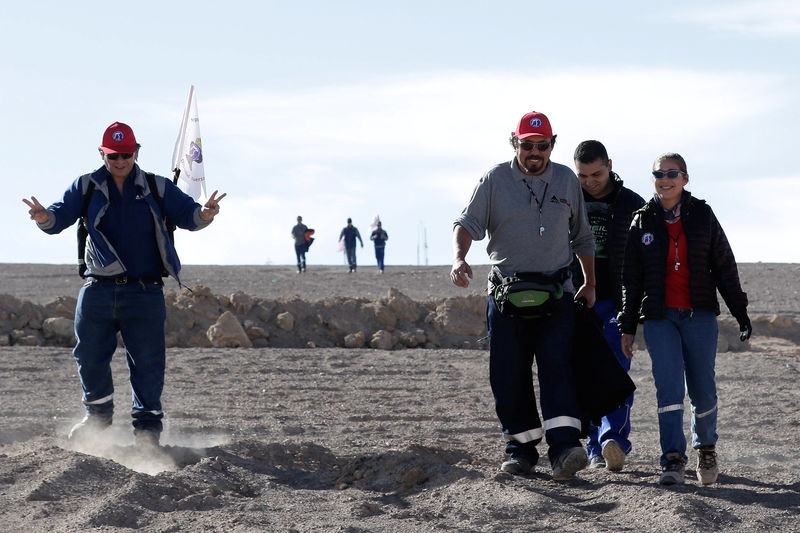By Gram Slattery and Fabian Cambero
SANTIAGO, March 24 (Reuters) - The end of a historic strike at Chile's Escondida copper mine, the world's biggest, has left its owner, BHP Billiton, nursing an estimated $1 billion loss and probably in a weaker position for negotiations in a year or so, company and industry insiders said.
On Thursday, the 2,500-member union at the mine decided to end the strike after 43 days by invoking a legal provision that allows it to extend the old contract by 18 months. will begin the gradual job of getting Escondida up and running again from Saturday, in a tense atmosphere and with little resolved for either the union or BHP BLT.L BHP.AX .
The resolution will be a relief for the Chilean economy, which analysts say may contract this quarter for the first time since 2009 due to the strike. Escondida produced some 5 percent of the world's copper last year and the resumption of output will also ease supply concerns.
Workers told Reuters on Friday they were satisfied with the result. Although they lose out on any signing bonus or pay rise, the extension means they get to maintain current working conditions and benefits, which Escondida wanted to change. Their position in 2018 will also be stronger, thanks to new labor laws in Chile coming into practice next month. Escondida is deeply disappointed, company insiders said. Negotiators underestimated the determination of the union to keep their benefits, and did not expect workers to trigger the legal provision and wind up losing out on their bonus, they said.
The company has not given an estimate for the cost of the stoppage, but extrapolating from its usual production rhythm gives a loss of close to $1 billion.
"We regret that the collective negotiation process ended in this way," Escondida President Marcelo Castillo said in a statement on Friday.
"This new scenario obliges us to revise our plans, our operating model, and our structures to face this reality, which evidently was not what we wanted," said Castillo.
The union rejected similar comments from Castillo on Thursday, calling them a veiled threat of layoffs, and saying that "if the company wants to lose another $1 billion, we are ready to fight."
REFORM GIVES WORKERS NEW TOOLS
When the two sides sit down next year, there will be one key difference.
Legislation passed last year by the center-left government of President Michelle Bachelet and taking effect next month will likely give the union a number of useful legal tools they previously lacked. round of Escondida negotiations was very atypical because it was the last before the labor reform," said Juan Carlos Guajardo, president of Chilean mining consultancy Plusmining.
The existing contract's expiry at the end of January meant that Escondida workers just missed out on being covered by the incoming law, he said.
From April, two of the union's three core demands will be at least partially covered by the new rules, lawyers said.
Reducing previous benefits would be largely illegal. And the company would be forced to use the previous contract's minimum benefits as its negotiating floor.
The labor reform will also prohibit the replacement of striking workers.
Contract negotiations would need to be initiated in as soon as a year, a short time after the mine is back up and running. Castillo said on Thursday the mine would take up to eight months to resume full operations.
Relations have become bitter after six weeks of recriminations and suspicion.
"The relationship between the company and the union is probably going to stay as it is now and the negotiations ended poorly," said labor lawyer Luis Lizama. "So I doubt we'll see good relations between the two sides going forward."
